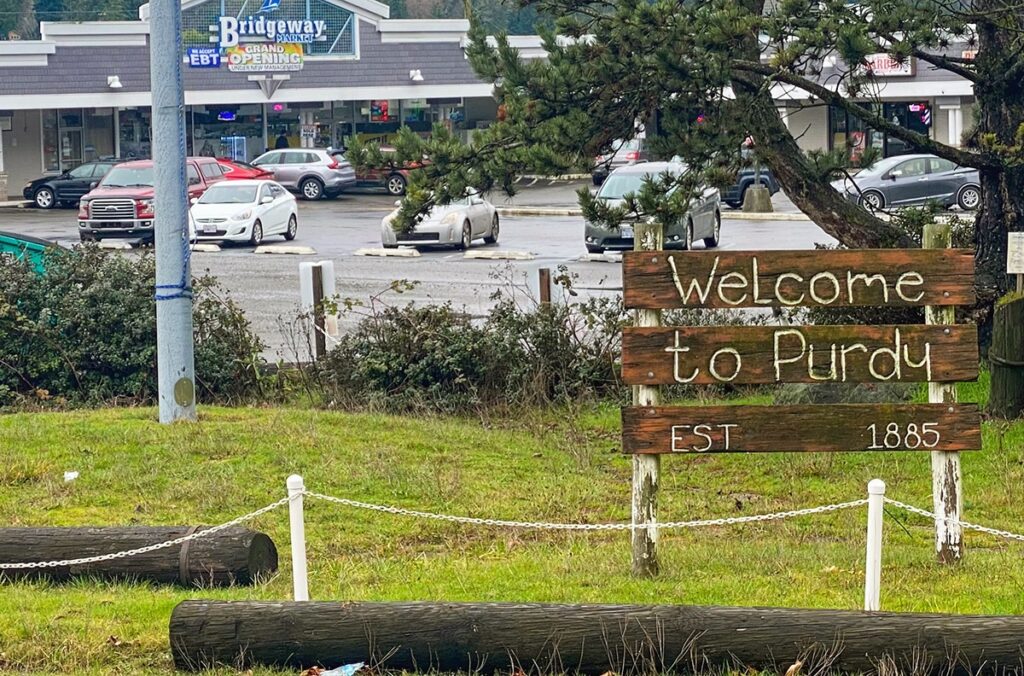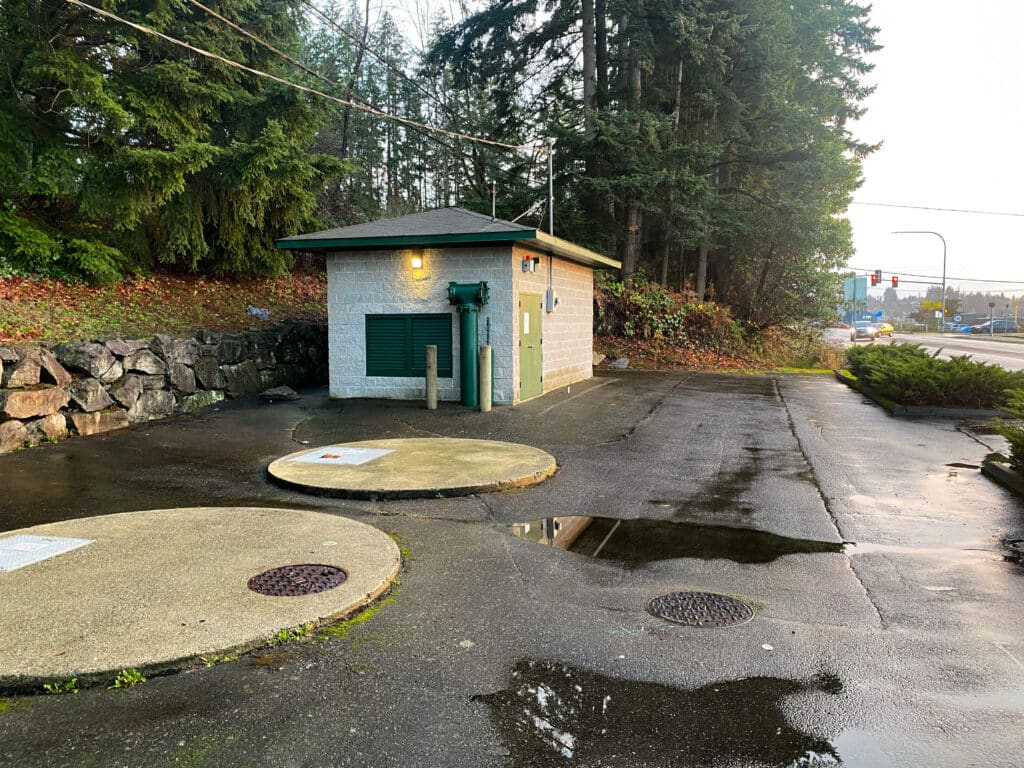Business Community
Rush sues Gig Harbor for Purdy sewer extension, challenges Pierce County over re-zone
Rush Companies has filed a lawsuit against the city of Gig Harbor, asking a Pierce County Superior Court judge to compel the city to allow Rush to connect its planned 90-unit multifamily development project in Purdy to the city’s sewer system. The city refuses to provide the sewer hookup, citing recent updates to the Pierce County Comprehensive Plan that remove Purdy from Gig Harbor’s urban growth area (UGA).
The lawsuit appears to be the first of multiple challenges by Rush to allow higher-density development on its Purdy land. The developer also plans to file an appeal with the state Growth Management Hearings Board contesting the removal of Purdy from Gig Harbor’s UGA, according to William Lynn, the land use attorney representing Rush.
Rush will file the appeal “within the next week,” Lynn said on Feb. 26. [Update: Rush filed its appeal with the state’s Growth Management Hearings Board challenging Pierce County’s removal of Purdy from Gig Harbor’s urban growth area on Monday, March 3. Purdy Interchange LLC, a Rush-owned entity, is the plaintiff.]
“[T]he ordinance removing [Purdy] from the UGA is in the process of being appealed and will likely be overturned,” Rush’s brief in the sewer connection lawsuit reads.
It adds that the changes affecting Purdy’s status in the updated comp plan occurred without “specific environmental review or review under the state’s Growth Management Act (GMA), or even meaningful discussion.” For this reason, “the change violates the GMA.”

Rush Companies filed an appeal with a state board over the removal of Purdy from the Gig Harbor urban growth area.
Purdy and the UGA
Purdy is an unincorporated community just north of Gig Harbor city limits, sandwiched between Henderson Bay to its west and Highway 16 to the east. The area contains homes, offices, shopping, schools, industrial aquaculture operations and a mix of other uses that defies categorization as purely urban or 100 percent rural.
Purdy has long been part of Gig Harbor’s urban growth area. Under state growth management law, counties designate UGAs on unincorporated land at the edge of cities. These areas are expected to absorb population growth and become more city-like. Their zoning fosters higher density growth than is permitted on rural land.
Urban growth areas may receive infrastructure such as sewer and water service from adjoining cities, and are viewed as likely targets for annexation by them. Cities can only annex areas that are in an urban growth area.
As Pierce County prepared a comprehensive plan update required by state law last year, it determined that it had a surplus of UGA land and sought to shed some. The county identified Purdy as a good target for UGA retraction.
County planners later changed their minds and proposed keeping Purdy in the Gig Harbor’s UGA. But by then, momentum had built for removal.
Important players in the comp plan update favored getting Purdy out of Gig Harbor’s UGA. Robyn Denson, the county council member representing Purdy and Gig Harbor, pushed for removal. She said her constituents favored slowing down growth. The downzoning resulting from UGA retraction would accomplish that.
The city of Gig Harbor supported the change, at least in part for financial reasons. Its consultants analyzed potential annexation targets within its UGA and concluded that Purdy would be the most expensive area for it to annex.
Rush responds
But property owners in Purdy cried foul over the proposed change. More than one year ago, Rush Development Manager Steve Yester wrote to the county that downzoning its 44 acres in Purdy would throw away “an opportunity that, with a little permitting support from Pierce County and the [city of Gig Harbor], could provide for additional missing-middle housing diversity at an existing mixed-use node with transit service.”
Yester wrote that Rush felt “whipsawed” by the proposed downzoning because Pierce County approved a change to higher-density Mixed Use District (MUD) zoning on Rush’s Purdy holdings just seven years earlier.
The county passed its comprehensive plan update that removed Purdy from Gig Harbor’s UGA on Dec. 3, 2024. But well before then, Rush Companies had a plan in motion to prevent the downzoning of its land by completing development applications that would lock in the existing, higher-density zoning.
One such application proposes building 90 new units of multifamily housing, and one single-family home, to 18.64 acres of land just west of Purdy Elementary School.
A Rush-owned entity called Purdy Interchange LLC would contribute 12.34 acres of this property and the rest would come from neighbors. Purdy Interchange LLC is the plaintiff in the lawsuit against the city of Gig Harbor.
While the county council approved the comp plan changes in early December, the update was not signed into law by the county executive until Feb. 5. Pierce County Planning & Public Works spokesperson Michelle Kircher said the county charter requires a 10-day waiting period after the executive’s signature before the updated plan goes into effect.
Sewer suit
Rush’s lawsuit says it requested a sewer connection for its 90-unit housing project from the city on Nov. 11, 2024. Although Purdy is outside Gig Harbor’s borders, city sewer lines extend into the area.
Sewer Lift Station 13 on Purdy Drive services Peninsula High School and other facilities. The lift station is adjacent to Rush-owned land and the developer holds easements that would allow it to run a line from the lift station to its proposed multifamily development site.

The Gig Harbor sewer system’s Lift Station 13 sits on Purdy Drive, adjacent to a Rush-owned property. In its lawsuit, Rush argues that the station has more than enough capacity to service its proposed multi-family housing development west of Purdy Elementary school.
In its legal brief, Rush/Purdy Interchange LLC says it filed a completed subdivision application for the project with Pierce County on Jan. 2 and maintains its properties are vested in the pre-existing Mixed Use District zoning.
Rush says its research shows the nearby sewer system runs at about 25% capacity and “existing Lift Station 13 can service more residential units than could possibly be built on the properties.”
City turned down Rush’s request
On Jan. 17, Gig Harbor Public Works Director Jeff Langhelm turned down Rush’s request for sewer service. His letter to Rush cited state law that cities should extend sewer and water services outside their urban growth areas only in “limited circumstances shown to be necessary to protect basic public health and safety and the environment, and when such services are financially supportable at rural densities and do not permit urban development.”
Langhelm’s letter noted that the comp plan update adopted on Dec. 3, 2024, removed Purdy from the Gig Harbor’s urban growth area. In light of the state law, the letter said, “the city is denying the sewer utility extension request.”
In its legal challenge to that denial, dated Feb. 4, Rush argues that “the ordinance removing the area from the UGA has not gone into effect. The project is vested to the urban zoning and necessary supporting urban services available at the time of the complete application.”
“The City is required to review the project as it is vested, not with an eye to future land use changes,” the brief argues.
Rush further states, “The Washington Supreme Court has held that where a city is the sole provider of a utility service, it is obligated to provide that service. Here, the parcels are in the City of Gig Harbor’s service area — an area that is urban in nature and that already has significant sewer infrastructure — and the City is the sole sewer service provider for the area.”
The city’s legal response
According to Rush, its land in Purdy is within the city of Gig Harbor’s “Wastewater Basin,” and in Gig Harbor’s Wastewater Comprehensive Plan (WCP), “the City holds itself out as willing to supply sewer to properties within the Wastewater Basin.”
Langhelm withheld comment on the lawsuit except to confirm that he sent the letter and “never received a response letter from Rush or Steve Yester.” Gig Harbor City Administrator Katrina Knutson also declined to comment.
In its initial legal brief in the case, filed last week, the city of Gig Harbor’s attorneys reject several of Rush Companies/Purdy Interchange’s key points. Among the arguments, they deny that Purdy was still within the city’s UGA at the time the lawsuit was filed, and reject the claim that Rush’s properties are vested in their earlier zoning.
The city’s brief denies that Rush’s lawyers’ interpretation of Washington Supreme Court precedent “is a correct interpretation or application of the law.” It also states that the Peninsula School District properties in Purdy “have private sewer lines owned and operated by the school district.”
The case has been assigned to Pierce County Superior Court Judge TaTeasha Davis, with an initial Land Use Petition Act hearing scheduled for March 21 and trial set for June 17.
